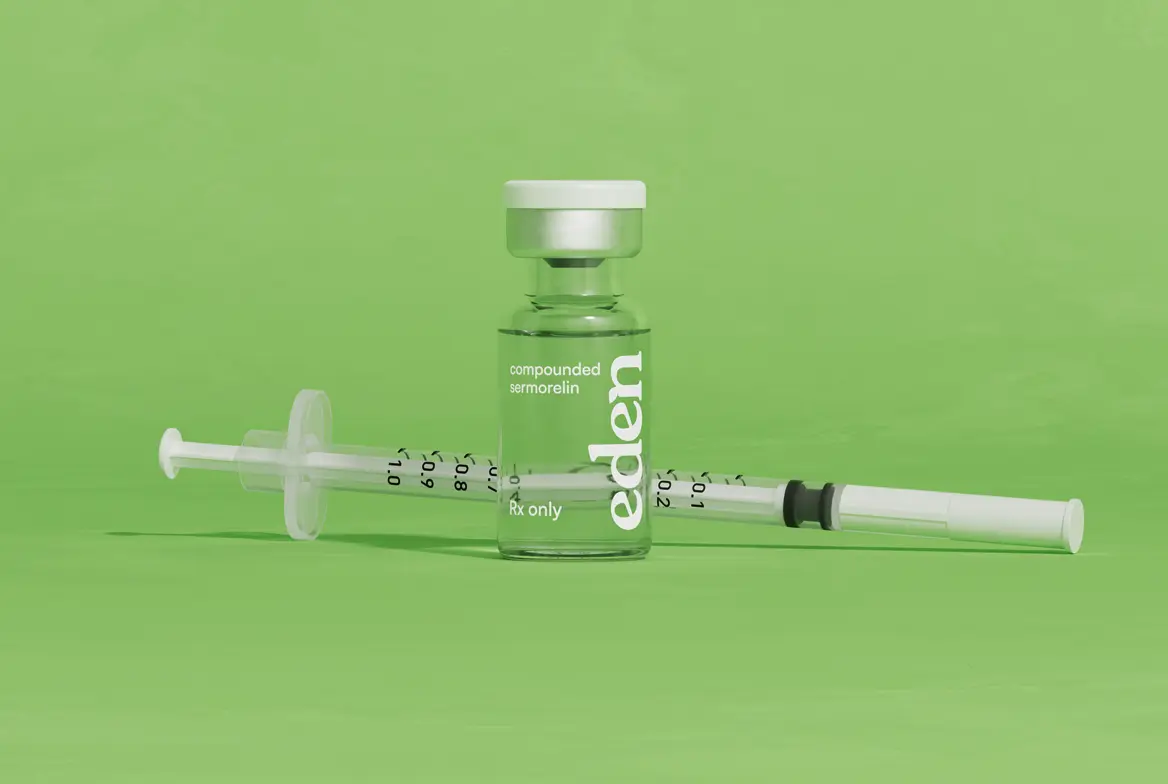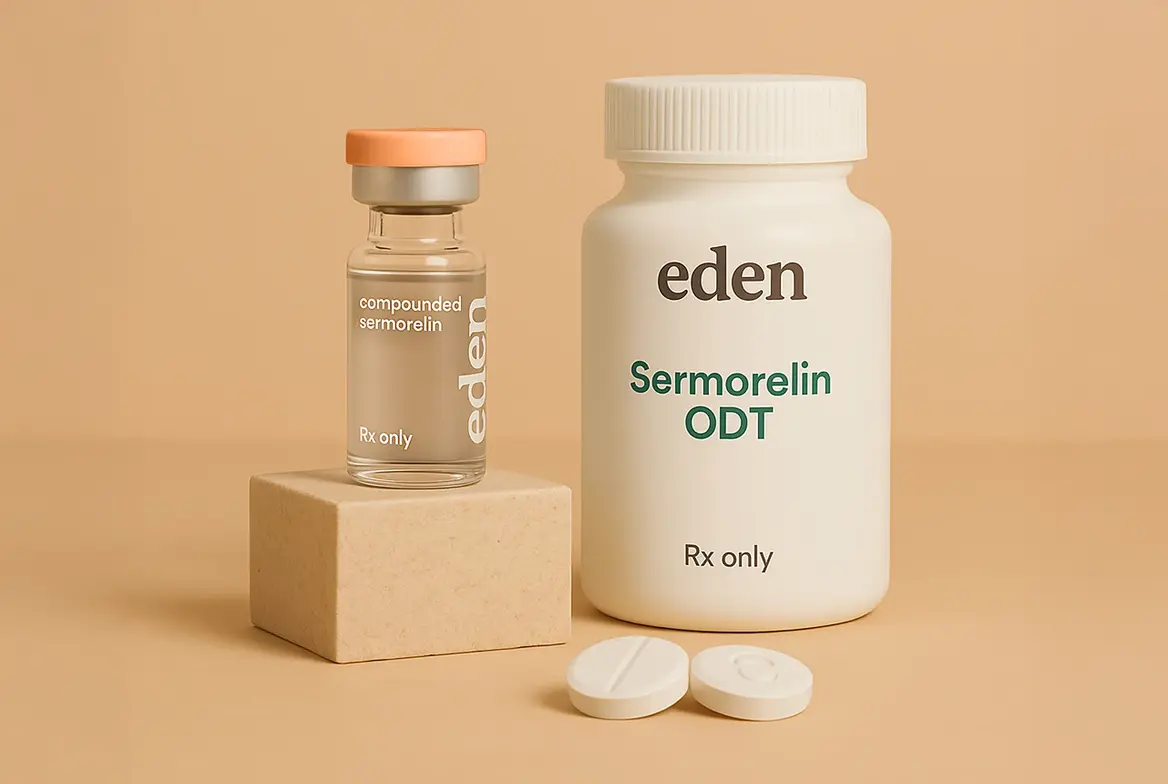Sermorelin Dosage Chart & Calculator


Sermorelin dosage calculator and dosing chart: mixing, measurement, schedules, and safety guidance for provider-supervised use.
- Sermorelin dosage chart and dosing calculator offering step-by-step guidance on measurement, mixing, and dosing ranges to support informed conversations with your clinician.
- Sermorelin dosing typically starts at 0.1-0.3 mg daily, with adjustments based on individual patient factors
- Standard treatment protocol involves 0.2 ml (300 mcg) administered five nights per week
- Proper storage at 36-46°F (2-8°C) is essential, though medication remains stable for up to 72 hours at room temperature
Please note that compounded medications are not reviewed by the FDA for safety, quality, or efficacy. You must consult and be assessed by a licensed healthcare provider who must determine whether or not you are an eligible candidate for sermorelin.

What is Sermorelin?
Sermorelin is a growth hormone therapy represented as a synthetic 29-amino acid peptide that mimics natural GHRH. By stimulating the pituitary gland, it enhances endogenous human growth hormone (hGH) production and secretion, offering advantages over direct hGH replacement therapy.
Therapeutic Applications
- Treatment of growth hormone deficiency
- Support for healthy hormone levels
- Enhancement of overall vitality
- Muscle mass maintenance support
Clinical Considerations
- Individual response variation
- Medical supervision requirement
- Regular monitoring protocols
- Safety assessment needs
Sermorelin Dosing
Sermorelin is typically administered via subcutaneous injection, with a general starting dose of 200–300 mcg, taken before bedtime to mimic the body's natural growth hormone (GH) release cycle. Please note that if you are prescribed by a licensed healthcare provider, they will determine the proper dosage for you based on your health assessment.
Dosages may be adjusted based on age, weight, treatment goals, and individual response, with cycles often lasting 3–6 months for optimal benefits.
Consulting a healthcare provider ensures proper dosing, monitoring for side effects, and maximizing treatment effectiveness. Proper dosing requires an evaluation of multiple patient factors.
Individual Assessment Factors
- Body Mass and Composition
- Higher mass may require dose adjustments
- Lean body mass considerations
- Overall body composition impact
- Age-Related Considerations
- Modified protocols for older individuals
- Age-specific response patterns
- Adjustment requirements
- Metabolic Factors
- Individual absorption rates
- Metabolic efficiency
- Processing variations
- Treatment Objectives
- Specific goal alignment
- Progress benchmarks
- Outcome measurements
Standard Protocol Guidelines
{{primary-cta}}
Sermorelin Dosage Protocol
Administration precision may impact treatment effectiveness. Sermorelin protocol elements include:
- Measurement Accuracy
- Proper syringe selection
- Precise drawing technique
- Volume verification
- Timing Considerations
- Evening administration
- Post-meal spacing
- Consistency importance
- Safety Protocols
- Sterile technique
- Site rotation
- Storage compliance
Sermorelin Mixing and Reconstitution
Proper reconstitution is essential for maintaining medication efficacy. Standard mixing ratios ensure correct concentration:
Reconstitution Guidelines
- 15mg vial: 7.5ml bacteriostatic water (2mg/ml)
- 9mg vial: 9ml bacteriostatic water (1mg/ml)
Step-by-Step Process
- Supply Preparation
- Bacteriostatic water
- Sterile syringes
- Alcohol swabs
- Clean workspace
- Sterilization Protocol
- Surface cleaning
- Vial preparation
- Equipment sterilization
- Mixing Technique
- Wall injection method
- Gentle swirling
- Particle inspection
Sermorelin Daily Dosage
The typical daily dosage of sermorelin ranges from 200 to 500 mcg, administered via subcutaneous injection, usually before bedtime, to align with the body's natural growth hormone (GH) secretion cycle.
Most patients start at 200–300 mcg daily, with adjustments based on age, weight, and treatment response. Higher doses may be prescribed for performance enhancement or anti-aging benefits, while lower doses are often used for general wellness and GH support.
Getting started with daily administration requires precise measurement and timing. Understanding unit conversion is essential for accurate dosing.
Administration Guidelines
- Timing Protocol
- Evening administration (bedtime preferred)
- Minimum 1-hour post-meal
- Consistent daily schedule
- 30-60 minute pre-meal restriction
- Injection Technique
- Subcutaneous delivery
- Site rotation
- Sterile procedure
- Proper depth
- Monitoring Requirements
- Response tracking
- Side effect documentation
- Progress assessment
- Dosage adjustment needs
Sermorelin Frequency
Treatment frequency aligns with natural hormone rhythms. The standard five-nights-per-week protocol balances therapeutic benefits with physiological rest periods.
Schedule Optimization
- Primary Administration Window
- Evening hours (9-11 PM typical)
- Consistent timing
- Natural GH peak alignment
- Weekly Structure
- Five consecutive nights
- Two-day rest period
- Flexibility for lifestyle
- Duration Considerations
- Initial phase (1-3 months)
- Maintenance phase
- Long-term management
Sermorelin Cycle Length
Treatment cycles require careful planning and monitoring. The medication's short half-life influences protocol design. A typical sermorelin cycle lasts 3 to 6 months, allowing the body to increase growth hormone (GH) production over time naturally.
Many patients follow a 5-day-on, 2-day-off protocol to prevent desensitization and maximize effectiveness. Long-term use may require periodic breaks or dose adjustments based on treatment response and GH levels, as monitored by a healthcare provider.
Cycle Components
- Initiation Phase
- Dosage establishment
- Response assessment
- Adjustment period
- Maintenance Phase
- Consistent administration
- Progress monitoring
- Optimization opportunities
- Rest Periods
- Strategic timing
- Duration determination
- Re-entry protocols
Safety Monitoring
Regular assessment of:
- Treatment response
- Side effect presence
- Hormonal balance
- Overall well-being
Sermorelin Dosage For Muscle Enhancement Support
Muscle enhancement protocols require specialized consideration of:
- Training Integration
- Exercise timing
- Recovery periods
- Performance metrics
- Nutritional Support
- Protein requirements
- Meal timing
- Supplementation needs
- Monitoring Parameters
- Body composition
- Strength metrics
- Recovery rates
- Adaptation signs
{{primary-cta}}
Sermorelin Protocol Adjustments
Sermorelin protocols may require adjustments based on individual response, treatment goals, and side effects.
Dosage modifications, typically ranging from 200 to 500 mcg per day, can be made to optimize growth hormone stimulation while minimizing side effects like water retention or injection site irritation.
Some patients may benefit from cycling the treatment (e.g., 5 days on, 2 days off) or adjusting injection timing for better results. Regular medical monitoring ensures the protocol remains effective and safe over the long term.
Final Thoughts
Successful sermorelin therapy relies on consistent dosing, proper injection timing, and lifestyle support to enhance natural growth hormone (GH) production. Patients typically notice improved energy, better sleep, increased muscle tone, and fat loss within a few weeks, with full benefits developing over 3 to 6 months.
Regular check-ups and dosage adjustments help ensure long-term effectiveness while minimizing side effects. Successful sermorelin therapy depends on protocol adherence and professional oversight. Success factors include:
Treatment Management
- Medical Supervision
- Regular provider consultation
- Progress evaluation
- Protocol adjustments
- Safety monitoring
- Patient Compliance
- Protocol adherence
- Documentation maintenance
- Communication consistency
- Lifestyle integration
- Optimization Strategies
- Timing refinement
- Technique improvement
- Response optimization
- Goal alignment
Long-term Considerations
- Progress Assessment
- Regular evaluations
- Goal achievement
- Protocol effectiveness
- Adjustment needs
- Safety Monitoring
- Side effect tracking
- Health markers
- Overall well-being
- Risk management
- Treatment Evolution
- Protocol refinement
- Goal adjustment
- Long-term planning
- Outcome optimization
For optimal results, patients should:
- Maintain consistent communication with healthcare providers
- Follow prescribed protocols precisely
- Document response and effects
- Report concerns promptly
- Integrate recommended lifestyle modifications
Treatment success requires an approach that combines proper dosing, careful administration, and ongoing medical supervision. Through diligent attention to these factors, patients can optimize their sermorelin therapy outcomes while maintaining safety and effectiveness.

Blog Components



The FDA does not approve compounded medications for safety, quality, or manufacturing. Prescriptions and a medical evaluation are required for certain products. The information provided on this blog is for general informational purposes only. It is not intended as a substitute for professional advice from a qualified healthcare professional and should not be relied upon as personal health advice. The information contained in this blog is not meant to diagnose, treat, cure, or prevent any disease. Readers are advised to consult with a qualified healthcare professional for any medical concerns, including side effects. Use of this blog's information is at your own risk. The blog owner is not responsible for any adverse effects or consequences resulting from the use of any suggestions or information provided in this blog.
Eden is not a medical provider. Eden connects individuals with independent licensed healthcare providers who independently evaluate each patient to determine whether a prescription treatment program is appropriate. All prescriptions are written at the sole discretion of the licensed provider. Medications are filled by state-licensed pharmacies. Please consult a licensed healthcare provider before making any medical decisions.
Frequently asked questions
No. The chart and calculator are for educational purposes only. A licensed healthcare provider must evaluate you and determine an appropriate dose, if any.
Skip the missed dose and resume your usual schedule. Do not double-dose. If you frequently miss doses, discuss timing strategies with your healthcare provider.
Contact your provider or seek medical care immediately. If safe to do so, bring your vial, syringe, and pharmacy-labeled concentration information if possible.
Evening dosing is commonly used to align with natural GH rhythms, typically at least 1 hour after your last meal, as directed by your provider.
Follow your pharmacy’s labeled concentration (e.g., mg/mL) and your provider’s instructions. If you’re unsure how many “syringe units” equal your prescribed mcg dose, ask your pharmacist or provider before injecting.
Your provider may order labs, such as IGF-1, when clinically indicated to help guide dosing and assess response.
- Walker RF, Codd EE, Barone FC, et al. Oral Activity of the Growth Hormone Releasing Peptides Growth Hormone Releasing Peptide-6 and Growth Hormone Releasing Peptide-2 in Beagle Dogs. Life Sciences. 2020;70(13):1489-1498. https://pubmed.ncbi.nlm.nih.gov/2117689/
- Merriam GR, Schwartz RS, Vitiello MV. Growth hormone-releasing hormone and growth hormone secretagogues in normal aging. Endocrine. 2019;24(1):22-32. https://pmc.ncbi.nlm.nih.gov/articles/PMC2544358/
- Russell-Aulet M, Jaffe CA, DeMott-Friberg R, Barkan AL. In vivo semi-quantification of hypothalamic growth hormone-releasing hormone (GHRH) output in humans: Evidence for relative GHRH deficiency in aging. Journal of Clinical Endocrinology & Metabolism. 2021;84(10):3490-3497. https://academic.oup.com/jcem/article/84/10/3490/2864483
- Prakash A, Goa KL. Sermorelin: A Review of its Use in the Diagnosis and Treatment of Children with Idiopathic Growth Hormone Deficiency. Drugs. 2018;58(4):767-781. https://pubmed.ncbi.nlm.nih.gov/18031173/
- Smith RG, Van der Ploeg LH, Howard AD, et al. Peptidomimetic Regulation of Growth Hormone Secretion. Endocrine Reviews. 2022;18(5):621-645. https://pubmed.ncbi.nlm.nih.gov/9331545/
- Gelato MC, Malozowski S, Caruso-Nicoletti M, et al. Growth Hormone (GH) Responses to GH-Releasing Hormone during Pubertal Development in Normal Boys and Girls: Comparison to Idiopathic Short Stature and GH Deficiency. Journal of Clinical Endocrinology & Metabolism. 2019;82(3):861-868. https://pubmed.ncbi.nlm.nih.gov/3086356/
- Thorner MO, Rochiccioli P, Colle M. Once Daily Subcutaneous Growth Hormone-Releasing Hormone Therapy Accelerates Growth in Growth Hormone-Deficient Children. Journal of Clinical Endocrinology & Metabolism. 2021;83(4):1214-1220. https://pubmed.ncbi.nlm.nih.gov/8772599/
- Alba M, Fintini D, Sagazio A, et al. Effects of Long-term Treatment with Growth Hormone-Releasing Hormone on Body Composition and Bone Mineral Density in Growth Hormone Deficient Adults. Clinical Endocrinology. 2020;73(2):200-209. https://pmc.ncbi.nlm.nih.gov/articles/PMC8884382/
- Sigalos JT, Pastuszak AW. The Safety and Efficacy of Growth Hormone Secretagogues. Sexual Medicine Reviews. 2018;7(2):284-297. https://pmc.ncbi.nlm.nih.gov/articles/PMC5632578/
- American Association of Clinical Endocrinologists. Medical Guidelines for Clinical Practice for Growth Hormone Use in Growth Hormone-Deficient Adults and Transition Patients. Endocrine Practice. 2022;25(11):1191-1232. https://pubmed.ncbi.nlm.nih.gov/20228036/
Thank you!
We'll be in touch.
Thank you!


























